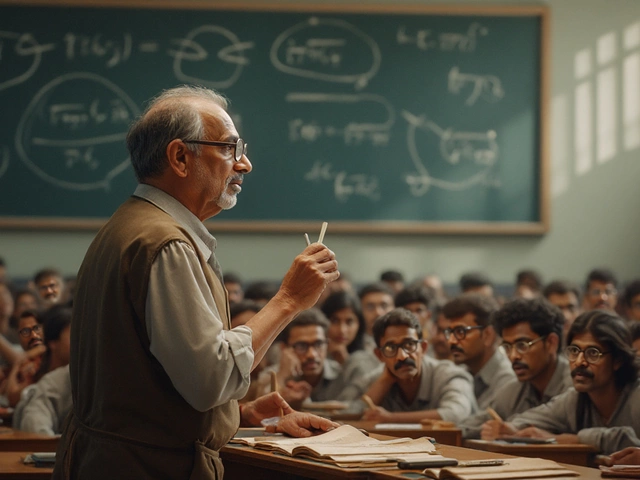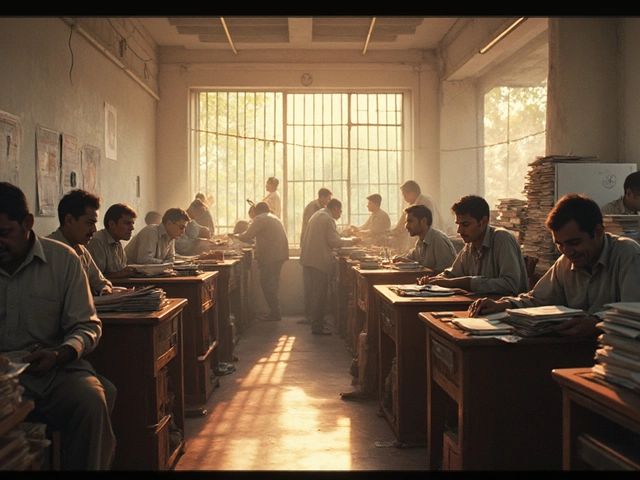
Stepping onto the path of future learning, ever wondered what truly separates vocational courses and traditional education? It boils down to their core focus. Traditional education leans heavily into theoretical knowledge, whereas vocational training emphasizes hands-on skills specific to certain trades. This means if you want to dive straight into a particular profession, vocational might just be your thing.
But here's a handy nugget—vocational training isn't just about technical skills. It's about gearing up for the workplace with precision. Imagine wanting to fix cars—you'd need more than just an understanding of how engines work; you’d need practical know-how. That's where vocational courses shine. You don’t just learn about the job; you learn to do the job.
On the flip side, education often paints the broader picture. You study subjects that might not immediately seem relevant but contribute to a well-rounded knowledge base. Think of it as building a versatile toolkit, useful for a range of careers or further studies down the line. So, depending on whether you’re chasing a specific career and want to start working soon, or enjoy taking your time to delve deep into theory, your choice could really set the tone for your future.
- Defining Vocational and Educational
- Hands-on Skills vs. Theoretical Knowledge
- Career Pathways and Opportunities
- Balancing Both Worlds
- Tips for Choosing Your Path
Defining Vocational and Educational
It's like comparing apples to oranges when looking at vocational training and traditional education—both great in their way but serving different purposes. Vocational courses, often tagged as 'career training', are all about diving straight into the skills you need for a specific job. Think electricians, chefs, or auto mechanics—these people typically get their start in vocational schools. They focus on job-specific skills that get you straight into the workforce, often within two years.
Different Focus, Different Outcomes
Educational courses, especially the ones you find at universities, generally focus less on specific job skills and more on building a broader knowledge base. Whether it's pursuing a Bachelor’s Degree in Arts or Sciences, the name of the game here is depth and theory in various subjects. That’s why people often consider them a stepping stone for diverse career paths or even further education like a Master's or Ph.D.
Both paths suit different learners and career aspirations. For instance, while someone might thrive in a vocational training setting because they love hands-on learning, another might prefer the broad exploration offered by traditional education. Interesting enough, a study found 67% of vocational graduates felt well-prepared for their roles compared to 45% of their university counterparts. These paths shape how we learn and how we step into the workforce.
So, whether you're leaning towards vocational courses brimming with specific skills or savoring the broad theories of education, both routes will carve distinct and rewarding futures.
Hands-on Skills vs. Theoretical Knowledge
Picture this: two different classrooms. In one, students are buried in books, diving deep into theories, concepts, and sometimes abstract ideas. This is your classic educational setup. On the other side, students are getting their hands dirty, learning by doing. Welcome to the world of vocational training.
Vocational courses are all about action. They're designed for those who want to get straight into the workforce with skills that employers value. Imagine learning electrical work and not about currents and circuits only, but also wiring up a house! This hands-on approach means you're ready to jump into a job with confidence.
Education, on the other hand, gives you a broad understanding of various subjects. This depth is fantastic if you're aiming for a career in academia or roles where you need detailed knowledge before applying skills. Think of fields like medical research or becoming an educator.
The Benefits of Each Approach
Both paths have their perks. With educational courses, you might not land a job straight out of college, but you’ll have a flexible skillset that can adapt over time. That can be a big plus if you're not entirely sure what you want to do long-term.
Meanwhile, vocational courses are like a fast track. They zone in on exactly what you need to know and do for specific careers, such as plumbing, culinary arts, or automotive repair. You get trained by industry professionals who know what employers want.
| Program Type | Average Duration | Career Start |
|---|---|---|
| Vocational Training | 6-24 months | Immediate |
| Traditional Education | 3-4 years | Post-Graduation |
Ultimately, it comes down to your goals. If you're aiming for a specific trade and want to start earning quickly, vocational could be your perfect fit. But if you're looking to explore and potentially pivot across different fields, traditional education might be more your speed.

Career Pathways and Opportunities
When it comes to picking a path in life, vocational courses and regular education offer two distinct roads. If you're looking for a career jumpstart, vocational training might have you covered. It's quick and often guides you straight towards jobs in fields like healthcare, technology, or trades. Yep, those pathways can be pretty lucrative and are usually in high demand.
Now, you might be wondering, what kinds of jobs can you end up with after some good old-fashioned vocational training? You could find yourself working as an electrician, a software developer, or even a dental hygienist. These roles don’t just offer job security but also a chance to advance without spending years in a classroom. Did you know that skilled trade workers are often among the highest-paid, non-degree professions? That's a good incentive right there.
On the other hand, traditional education can open doors to careers that require degrees, like becoming a doctor, lawyer, or an academic researcher. Though it takes longer to finish, you'll end up with a credential that's broadly recognized worldwide.
Vocational Jobs On The Rise
With industries always evolving, some skills are hotter than the sun. Take IT support staff or cybersecurity experts, for example. As companies pivot more towards tech, these roles have seen a real boom. Enrolling in courses that focus on these areas can quickly lead you to a job.
The Blend of Both Worlds
Sometimes, the best strategy involves a little mix and match. Getting a base education and then honing specific skills via vocational courses can make you an all-rounder. It's like having the know-how while also being ready to tackle practical challenges head-on.
Want a quick look at the benefits of these careers? Check out this simple table.
| Career Path | Average Starting Salary (USD) | Usual Training Time |
|---|---|---|
| Electrician | 60,000 | 2-4 years |
| Software Developer | 70,000 | 1-3 years |
| Nurse | 65,000 | 3-5 years |
So whichever road you embark on, both vocational and educational paths offer abundant opportunities that can align with your personal goals and interests. Take your time, weigh the pros and cons, and choose the journey that makes sense for your aspirations.
Balancing Both Worlds
Combining the world of vocational courses with traditional education might seem tricky at first, but it’s quite possible and often beneficial. Many people are finding success by blending the two, crafting unique career paths that tap into diverse skill sets.
Why Mix Vocational and Educational?
Not everyone fits neatly into one category. Some people thrive with a mix of hands-on learning and theoretical knowledge. Take, for instance, a tech enthusiast who's equally passionate about coding and understanding the science behind it. Balancing both gives you the flexibility to handle practical tasks while grasping complex concepts.Benefits of the Blend
Here’s why this combo works so well:- Better Job Readiness: By combining, you’re not just workplace-ready; you're adaptable.
- Broad Skill Set: Employers value a well-rounded toolkit. Having both practical and theoretical skills makes you versatile.
- Higher Earning Potential: While vocational training can get you in the door quickly, adding educational qualifications might level up your earnings over time.
Educational Institutions Catching On
Did you know more universities are now offering dual programs? These programs let you earn an academic degree alongside a vocational certificate. For example, some business schools provide courses that include real-world entrepreneurial projects, ensuring that you have both academic learning and vocational training under your belt.Real-Life Examples
Consider the realm of healthcare: A nurse who supplements their vocational background with a degree in healthcare management not only provides patient care but can also step into administrative roles.You can see, blending vocational and educational paths is more than just achievable; it's a strategic way to maximize your potential. With a clear plan, you can tailor your learning journey to fit your career goals perfectly.

Tips for Choosing Your Path
Stuck between traditional education and vocational courses? Let's untangle that decision with some practical steps.
Identify Your Interests
Your interests can offer clues on the direction you should take. If you’re hands-on and love creating or fixing things, vocational training might be your playground. Conversely, if diving into books and theories fascinates you, then a more traditional educational approach could be the ticket.
Consider Your Career Goals
Thinking about where you want to be in the next five or ten years can be enlightening. Certain careers need professional degrees, while others value experience and skills, which you get straight from vocational courses. Research what’s necessary for your dream job.
Evaluate Time and Financial Investment
The time and money you're willing to invest also play a huge role. Vocational training often gets you job-ready in less time compared to years in college. Plus, it can cost less, which is a perk if you’re eager to jump into the workforce sooner rather than later.
Flexibility and Learning Style
Keep in mind how you learn best. If structured classes with assessments get you going, traditional education works. If you prefer learning by doing, the on-the-job style of vocational courses could be spot on.
Seek Real-World Advice
Ever thought about chatting with people who’ve walked the paths you’re considering? Their experiences could provide valuable insights. They might highlight what you can’t see in brochures or websites.
Ultimately, there’s no wrong choice. It’s about what fits your ambitions and lifestyle best. So take a breather, think it over, and make the call that feels right.




